|
|
|
Sort Order |
|
|
|
Items / Page
|
|
|
|
|
|
|
| Srl | Item |
| 1 |
ID:
160806
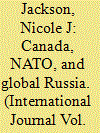

|
|
|
|
|
| Summary/Abstract |
Today Russia poses significant challenges that require sophisticated responses from both Canada and the North Atlantic Treaty Organization (NATO), yet more research is needed on almost all aspects of policy development. Academic experts on NATO and Russia could contribute significantly to this process. To this end, collaboration and engagement among those experts with each other’s literature would be highly beneficial. Appropriate methodologies must be developed to answer questions about Russia’s specific intentions, test the assumptions upon which NATO and Canada’s policies are founded, and discover and respond to the root causes of Russia’s discontent. Policy options should be based on detailed knowledge of global security dynamics, as well as high-quality analysis about Russia’s rhetoric and its varied use of hard, soft, and sharp soft power in regional and global cases. A research network on these topics could help decision-makers respond to these complex developments by approaching them through “the eyes of our adversaries,” clarifying the big picture of hybrid warfare and also the micro-level details.
|
|
|
|
|
|
|
|
|
|
|
|
|
|
|
|
| 2 |
ID:
185227
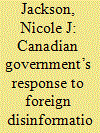

|
|
|
|
|
| Summary/Abstract |
In recent years, governments have considered how to respond to “disinformation.” However, there is little academic literature on Canada’s response in the area of security and foreign policy. This paper addresses this gap by analyzing how and why Canadian government foreign and security actors have “securitized” foreign disinformation. It argues that, since 2014, they have increased awareness about disinformation and transformed it into a matter of “security” through rhetoric and discursive framing, as well as stated policy intentions and actions. This has occurred in response to perceived threats, but without coherent policy. The findings suggest that challenges are linked to persistent difficulties in defining and understanding disinformation. The result has been fragmented actions, some of which may legitimate actions that deviate from “normal political processes.” The implications are that definitional challenges need to be addressed, the role of security actors assessed, and a clearly articulated and holistic strategy drawn.
|
|
|
|
|
|
|
|
|
|
|
|
|
|
|
|
| 3 |
ID:
075395
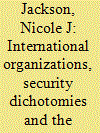

|
|
|
|
|
| Publication |
2006.
|
| Summary/Abstract |
This article offers a constructive critique of the Copenhagen School's 'securitization' framework by applying it in an analysis of the role of international organizations seeking to counter the trafficking of narcotics and persons in post-Soviet Central Asia. The study discovers common and divergent motivations that explain international attempts and failures to securitize. In the case of human trafficking, significant clashes created obstacles to international efforts. In both cases, international organizations advanced their agendas through the language of security, but also through institutional changes and increased resource allocation. These processes led to the adoption of mostly traditional security strategies. The analysis concludes that although the securitization framework makes significant contributions as an analytical tool, its definition is too vague and it is too narrow in focus. 'Security dichotomies' need to be taken into account in a comprehensive analysis of why international attempts to securitize issues sometimes succeed and sometimes fail. The influence of rhetoric on the development of policy should also be taken into account if the securitization framework is to provide a complete understanding of the issues or be useful for policymakers.
|
|
|
|
|
|
|
|
|
|
|
|
|
|
|
|
| 4 |
ID:
061404
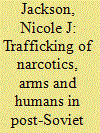

|
|
|
| 5 |
ID:
128246
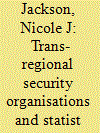

|
|
|
|
|
| Publication |
2014.
|
| Summary/Abstract |
This paper argues that there is an emerging trans-regional security complex reaching from Russia through Central Asia to China. Shared security norms have resulted in statist multilateralism, that is, state-directed cooperation on shared interests while closely guarding distinct identities and specific political features. The paper outlines member states' key political values and shows how they 'framed' shared understandings about security. It then explains how security norms inform the institutional designs of the two main multilateral security organisations thereby directing the nature of cooperation, testing the argument in two key conflicts: in Kyrgyzstan and Afghanistan.
|
|
|
|
|
|
|
|
|
|
|
|
|
|
|
|
|
|
|
|
|